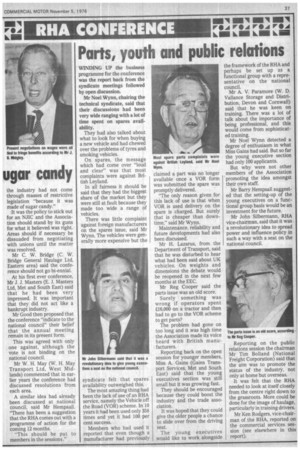Parts, youth and public relations
Page 39

If you've noticed an error in this article please click here to report it so we can fix it.
WINDING UP the business programme for the conference was the report back from the syndicate meetings followed by open discussion.
Mr Noel Wynn, chairing the technical syndicate, said that their discussions had been very wide ranging with a lot of time spent on spares availability.
They had also talked about what to look for when buying a new vehicle and had chewed over the problems of tyres and smoking vehicles.
On spares, the message which had come over "loud and clear" was that most complaints were against British Leyland.
In all fairness it should be said that they had the biggest share of the market but they were still at fault because they made too wide a range of vehicles.
There was little complaint against foreign manufacturers on the spares issue, said Mr Wynn. The vehicles were generally more expensive but the syndicate felt that spares availability outweighed this.
The most amazing thing had been the lack of use of an RHA service, namely the Vehicle off the Road (VOR) scheme. In 10 years it had been used only 358 times and yet it had 100 per cent success.
Members who had used it reported that even though a manufacturer had previously claimed a part was no longer available once a VOR form was submitted the spare was promptly delivered.
"The only reason given for this lack of use is that when VOR is used delivery on the spare is charged. But surely that is cheaper than downtime," said Mr Wynn.
Maintenance, reliability and future developments had also been discussed.
Mr H. Lazarus, from the Department of Transport, said that he was disturbed to hear what had been said about UK vehicles. On weights and dimensions the debate would be reopened in the next few months at the EEC.
Mr Reg Cooper said the parts issue was an old score.
Surely something was wrong if operators spent £16,000 on a tractor and then had to go to the VOR scheme to get parts?
The problem had gone on too long and it was high time the Association made its voice heard with British manufacturers.
Reporting back on the open session for younger members, Miss A. Gains (Gains Transport Services, Met and South East) said that the young executives section was still small but it was growing fast.
They should be encouraged because they could boost the industry and the trade association.
It was hoped that they could give the older people a chance to slide over from the driving seat.
The young executives would like to work alongside the framework of the RHA and perhaps be set up as a functional group with a representative on the national council.
Mr A. V. Paramore (W. D. Valiance Storage and Distribution, Devon and Cornwall) said that he was keen on training. There was a lot of talk about the importance of being professional, and this would come from sophisticated training.
Mr Noel Wynn detected a degree of enthusiasm in what Miss Gains had said. But so far the young executive section had only 100 applicants.
But why were not other members of the Association promoting the idea amongst their own staff.
Mr Barry Hempsall suggested that the setting-up of the young executives on a functional group basis would be an investment for the future.
Mr John Silbermann, RHA vice-chairman, said that it was a revolutionary idea to spread power and influence policy in such a way with a seat on the national council.
Reporting on the public relations session the chairman Mr Tim Bolland (National Freight Corporation) said that the aim was to promote the status of the industry, not only at home but overseas.
It was felt that the RHA needed to look at itself closely from the centre right down to the grassroots. More could be done for the image of haulage, particularly in training drivers.
Mr Ken Rodgers, vice-chairman of the RHA, reported on the commercial services session (see elsewhere in this report).
































































































